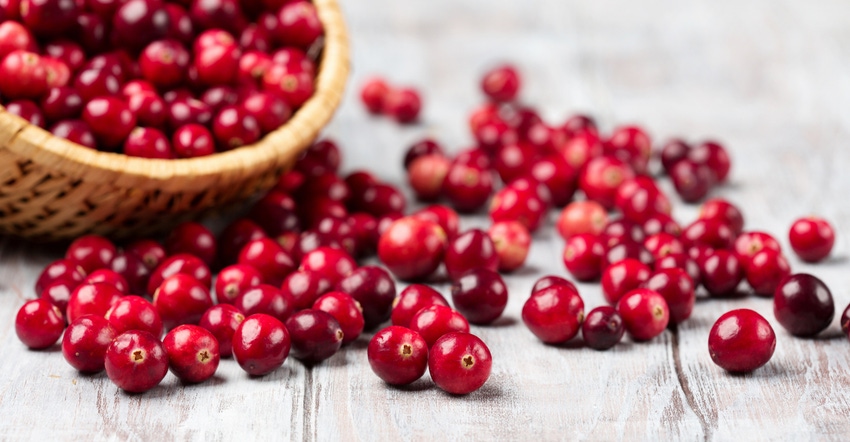Daily cranberry consumption improved memory and brain function in older adults, according to a new study.

People are living longer, which means researchers are tasked with finding solutions to diseases of the elderly, like dementia—which affects more than 55 million people worldwide, according to Alzheimer’s Disease International. That number will double every 20 years to reach almost 140 million in 2050.
Regularly eating cranberries may help, according to a new study that found daily cranberry consumption improved memory and brain function in older adults (Front Nutr. 2022. DOI:10.3389/fnut.2022.849902).
Cranberries are a rich source of polyphenols such as anthocyanins, proanthocyanidins, flavanols and hydroxycinnamic acids, bioactive compounds that exhibit antioxidant, anti-inflammatory, antimicrobial and other effects. However, not much is known about the effect of cranberries on cognitive performance, researchers contended.
In this study, a 12-week, randomized, placebo-controlled trial published in Frontiers in Nutrition, 60 adults ages 50 to 80 years were administered freeze-dried cranberry powder (the equivalent of 1 cup or 100 grams of fresh cranberries) daily or placebo. The cranberry powder was calculated to provide 281 mg proanthocyanidins, with increase of 20 mg flavanols and 59 mg anthocyanins per day.
People who were previously diagnosed with dementia, a significant neurological condition or significant memory complaints, among other criteria, were excluded from the trial.
To measure the impact of daily cranberry intake on cognition, brain function and biomarkers of neuronal signaling, participants underwent an extensive cognitive assessment that measured memory and executive function, provided blood samples, and received an MRI scan before and after the 12-week intervention.
The results showed daily cranberry supplementation equivalent to 1 cup of cranberries over 12 weeks improved episodic memory performance and neural functioning.
“Daily supplementation with freeze-dried cranberry extract (equivalent to one cup of fresh cranberries) led to significant improvements in episodic memory performance, which coincided with increased perfusion of key neural areas which support cognition in older adults,” researchers wrote.
Working memory and executive functioning were unaltered by cranberry consumption, results showed, despite that other flavonoid-rich juices such as blueberry, Concord grape juice and orange juice have shown benefits in these areas.
“This could in part relate to the distinct polyphenolic composition of each distinct intervention,” researchers wrote.
Similarly, cranberry intervention had no impact on structural grey matter or white matter hyperintensities (WMH)—a type of brain tissue damage associated with cognitive decline—between groups over the 12-week period of investigation.
Interestingly, cranberry intake significantly decreased low-density lipoprotein (LDL, or “bad”) cholesterol and total cholesterol.
This study and others investigating the benefits of foods and beverages for dementia—a disease for which there is no treatment—may yield solutions that can help aging populations not only live longer, but maintain a higher quality of life as they age.
About the Author(s)
You May Also Like






